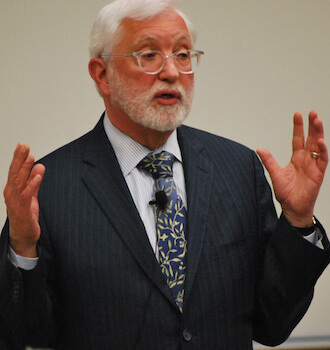A US district judge has ruled that the estate of a public school student who committed suicide after allegedly suffering severe harassment from fellow students can amend its complaint to add a federal Title IX cause of action for sex discrimination by an educational institution, based on the homophobic nature of slurs aimed at the dead young man.
The kicker, however, is that the plaintiff can make the amendment only because it does not allege that the deceased student was in fact gay!
The March 14 ruling from Judge Glenn T. Suddaby of the Northern District of New York came on pretrial motions in Estate of D.B. v. Thousand Islands Central School District.
US judge finds federal Title IX applies only to those mistaken for gay
Suddaby’s opinion lacks any coherent narration of the facts, only mentioning individual allegations in passing while analyzing the motions before the court. The case apparently concerns a male public school student who was subjected to bullying and harassment by fellow students and got no protection from school officials. He committed suicide at home.
The original complaint alleged violations of the US Constitution’s 14th Amendment, the federal Rehabilitation Act, Americans with Disabilities Act, and Individuals with Disabilities Education Act, as well as the New York State Education Law and Dignity for All Students Act. Suddaby’s opinion does not identify the nature of D.B.’s alleged disability.
The plaintiff’s amended complaint sought to add sex discrimination claims under federal and state law, most significantly Title IX of the Education Amendments Act, which the US Department of Education has construed to protect gay students from bullying and harassment.
Suddaby’s opinion is particularly interesting for the way in which he analyzed the motion to add a federal Title IX sex discrimination claim.
Suddaby found that because precedent from the Second Circuit Court of Appeals –– which has jurisdiction over US district courts in New York State –– rejects the idea that sexual orientation discrimination is actionable as sex discrimination under federal law, a student who is harassed with homophobic slurs would have an action under Title IX if the student alleged that the harassment was due to his incorrectly perceived sexual orientation –– but not his actual homosexual orientation.
The judge’s discussion of the Title IX claim has a certain “Through the Looking Glass” quality to it. For example, the judge rejects the allegation that calling a boy a “pussy” could be seen as a sexually-related slur.
The complaint alleges: “[Another student] called the Decedent a ‘pussy,’ and told him, ‘You’re a pussy and you need the shit kicked out of you.’ These are the types of anti-gay and gender-related slurs Decedent was consistently subjected to.’”
Suddaby begs to differ.
“As shocking as this slur may be,” he wrote, “the Court is not persuaded that it is related to gender under the circumstances. Rather, as Defendants point out, the slur ‘pussy’ is more likely to mean ‘coward’ than anything gender related. Even if the other student did intend the slur to relate to gender, Plaintiff has not made a proper showing of that fact. Rather, most of Plaintiff’s reference to ‘gender-related slurs’ are nothing more than conclusory statements.”
On the other hand, Suddaby accepted the argument that explicitly homophobic slurs could support a “gender stereotyping” claim of sex discrimination under Title IX, provided that the plaintiff was not gay.
“The Second Circuit recognizes a fine line between gender stereotyping and bootstrapping protection for sexual orientation,” he wrote. “Because a Title IX sex discrimination claim is treated in much the same way as a Title VII sex discrimination claim, Title VII jurisprudence therefore applies. Under the ‘gender stereotyping’ theory of liability under Title VII, individuals who fail or refuse to comply with socially accepted gender roles are members of a protected class. However, courts in the Second Circuit do not recognize sexual orientation as a protected classification under Title VII or Title IX. The critical fact under the circumstances is the actual sexual orientation of the harassed person. If the harassment consists of homophobic slurs directed at a homosexual, then a gender-stereotyping claim by that individual is improper bootstrapping. If, on the other hand, the harassment consists of homophobic slurs directed at a heterosexual, then a gender-stereotyping claim by that individual is possible.”
In this case, the plaintiff is not alleging that D.B. was gay. To the contrary, wrote Suddaby, “D.B.’s own alleged statements refer to accusations that he was homosexual as ‘stupid gay rumours [sic].’ Moreover, the Amended Complaint alleges that the bullying was based on D.B.’s ‘actual or perceived sexual orientation’ and his ‘perceived and/or presumed sexual orientation.’ Under the circumstances, the Amended Complaint alleges facts plausibly suggesting a gender-stereotyping claim to survive a [dismissal] motion; and the amendment to include this claim is not futile.”
Suddaby’s opinion reflects the retrograde state of the law within the federal Second Circuit as a result of a 2000 Court of Appeals decision, Simonton v. Runyon, which rejected a Title VII sex discrimination brought by a gay plaintiff subjected to sexually-oriented workplace harassment. Attempts are underway to get the Circuit to reconsider this precedent in the context of ongoing litigation asserting sexual orientation discrimination claims under federal sex discrimination statutes (see related employment discrimination lawsuit story on page 10), in line with a ruling by the Equal Employment Opportunity Commission in July 2015 that sexual orientation discrimination is “necessarily” sex discrimination in violation of Title VII.
EEOC rulings are not binding on the courts, however, and the persuasiveness of this particular EEOC ruling is somewhat compromised by the fact that it represents a reversal of almost half a century of agency precedent.
The Estate of D.B. is represented by Michael D. Meth of Chester, New York. Charles C. Spagnoli and Frank W. Miller of East Syracuse represent the school district. Suddaby was appointed to the district court by President George W. Bush during the last year of his second term.
































